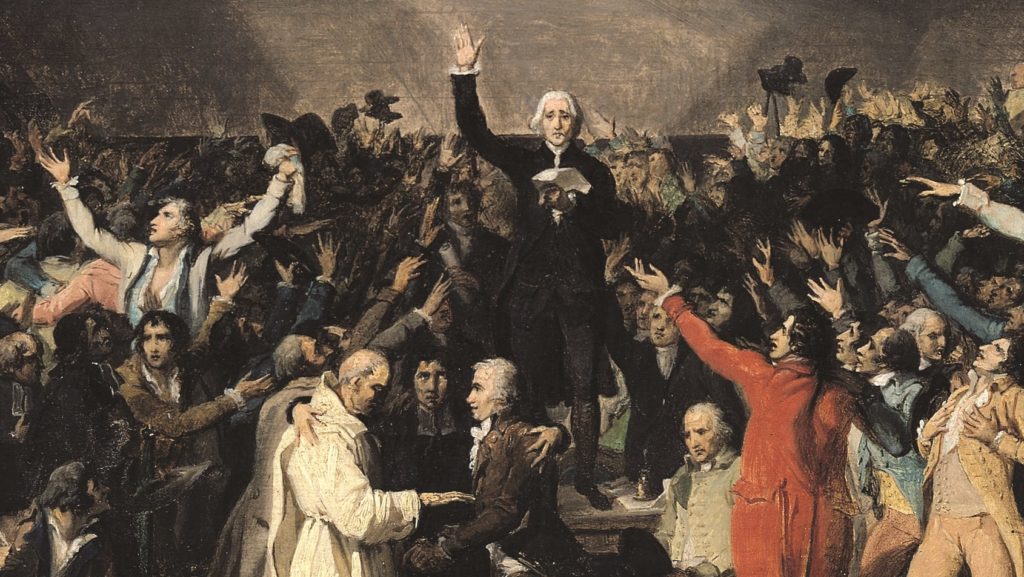Part I | II | III | IV | V | VI
The Enlightenment legacy is a key topic of debate among socialists today, and it still inspires heated controversy. Not everyone on the Left believes that the Enlightenment is a useful framework. Indeed, some think the Enlightenment is utterly retrograde, bound up with the reactionary capitalist ideologies that have helped sustain class domination, racism, and European colonialism. Citing these negative connotations, some left-wing critics cast aside the Enlightenment as irremediably bourgeois.1For a treatment of the Enlightenment as responsible for all the reactionary horrors of modernity, see Zygmunt Bauman’s influential book, Modernity and the Holocaust (Cambridge: Polity Press, 1989).
The authors do not share this view. Neither did Marx, Engels, or the tradition of classical Marxism.2The expression “classical Marxism” refers to the tradition of Marx, Engels, Kautsky, Plekhanov, Luxemburg, Lenin, and Trotsky. It was first used by the Marxist historian Isaac Deutscher in “Marxism in Our Time,” lecture given at the London School of Economics, in February 1965, Marxists Internet Archive. Instead, we should take a more dialectical approach in confronting the Enlightenment. This means deepening what is universal and revolutionary in Enlightenment thinking but also criticizing what is contingent and backward. In other words, a dialectical approach rescues the Enlightenment baby and throws out the bourgeois bathwater.3The authors have previously discussed these ideas in the following articles: Harrison Fluss and Landon Frim, “Dialectical Enlightenment,” Jacobin, May 16, 2017; Harrison Fluss and Landon Frim, “Aliens, Antisemitism, and Academia,” Jacobin, March, 11, 2017; Doug Enaa Greene, “Blanqui and the Communist Enlightenment,” Left Voice, December 28, 2017.
Radical and Moderate Enlightenment
One of the most important contemporary historians of the Enlightenment and its political heritage is Jonathan Israel, a British-born historian who has taught at the University College London and Princeton University. He is the author of a wide-ranging series of studies on the Enlightenment project. Israel makes a clear case in his books for why the Enlightenment matters today, and rejects fashionable skepticism toward modernity:
Does it really matter how we interpret the Enlightenment? Surely, it does. For while it has been fashionable in recent years, above all (but not only) in the Postmodernist camp, to disdain the Enlightenment as biased, facile, self-deluded, over-optimistic, Eurocentric, imperialistic, and ultimately destructive, there are sound, even rather urgent, reasons for rejecting such notions as profoundly misconceived and insisting, on the contrary, that the Enlightenment has been and remains by far the most positive factor shaping contemporary reality and those strands of “modernity” anyone wishing to live in accord with reason would want to support and contribute to.4Jonathan Israel, Enlightenment Contested: Philosophy, Modernity, and the Emancipation of Man 1670–1752 (Oxford: Oxford University Press, 2006), v.
Israel’s contribution to Enlightenment history is groundbreaking, and not just in terms of the encyclopedic range of his books; more crucial is his theoretical-historical distinction between the Moderate Enlightenment and the Radical Enlightenment. The moderate camp attempted to reconcile reason with religious orthodoxy, thereby accommodating monarchy, racism, and established hierarchies. Examples of the Moderate Enlightenment include such thinkers as Locke and Voltaire, who considered reason the exclusive privilege of the upper classes. They did not believe ordinary people should be enlightened, since an educated mass would overthrow the traditional social order.
On the other hand, the Radical Enlightenment was an uncompromising affirmation of reason; it did not seek to accommodate thrones or altars. In contrast to the moderate camp, it upheld secularism, democracy, materialism, egalitarianism, as well as racial and gender equality. The pioneer of Radical Enlightenment for Israel was the 17th-century excommunicated Dutch-Jewish philosopher Baruch Spinoza. Spinoza represented a universal philosophical revolution that stemmed from his monistic system. This system abolished the notion that God is a personal creator and demonstrated that God and nature were one and the same thing. By thoroughly excluding the supernatural, this secular metaphysics became the basis for a new thinking about democratic freedom and social equality. For Spinoza, all human beings can use reason to understand and shape their world.
While the Moderate Enlightenment attempted to make reason safe for the ancien régime, according to Israel, the Radical Enlightenment was an essential ingredient of the 18th century’s revolutions. As with Marxism in the Russian Revolution, one cannot comprehend the American, French, and Haitian revolutions without the backdrop of Enlightenment thinking. As Israel says, “All Enlightenment by definition is closely linked to revolution.”5Jonathan Israel, Democratic Enlightenment: Philosophy, Revolution, and Human Rights 1750–1790 (Oxford: Oxford University Press, 2011), 7. The American Declaration of Independence, the French Declaration of the Rights of Man and Citizen, and the Haitian abolition of slavery were all motivated by Radical Enlightenment ideas. The Enlightenment was far from being reducible to European concerns; in justifying the Haitian Revolution, leader Toussaint Louverture invoked the ideals of the French Revolution: Liberté, égalité, fraternité.6C. L. R. James, Black Jacobins: Toussaint L’Ouverture and the San Domingo Revolution (New York: Vintage Books, 1989), 198. This showed that Enlightenment thinking could underpin the universal emancipation of all people.
Edmund Burke, the arch-conservative opponent of the French Revolution, understood how contagious Enlightenment ideas were for the oppressed; that these ideas were political dynamite, not just in terms of storming Bastilles, but also in igniting anti-slavery and anti-colonial revolts. Burke, in addressing the French revolutionaries, points to the dangerous consequences of their ideas for the colonies:
In what chapter of your code of the rights of men are they able to read that it is a part of the rights of men to have their commerce monopolized and restrained for the benefit of others? As the colonists rise on you, the negroes rise on them. Troops again, — massacre, torture, hanging! These are your rights of men! These are the fruits of metaphysic declarations wantonly made and shamefully retracted!7Edmund Burke, Reflections on the Revolution in France (Chicago: Gateway, 1968), 313.
Burke’s fears were justified in Robespierre’s cry: “Perish your colonies, if you are keeping them at that price. Yes, if you had either to lose your colonies, or to lose your happiness, your glory, your liberty, I would repeat: perish your colonies.”8Eric Hazan, A People’s History of the French Revolution (London: Verso, 2014), 141.
Radical Enlightenment and Marxism
Israel is not alone in recognizing the Enlightenment as the ideological basis of these revolutions. There is a tradition in Hegel and Marxism that grasps how these ideas became a material force in society; that as Engels put it, the French Revolution was a time when “the world stood upon its head; first in the sense that the human head, and the principles arrived at by its thought, claimed to be the basis of all human action and association; but by and by, also, in the wider sense that the reality which was in contradiction to these principles had, in fact, to be turned upside down.”9Friedrich Engels, Anti-Dühring: Herr Eugen Dühring’s Revolution in Science (1878), in Marx and Engels Collected Works [henceforth MECW], vol. 25 (London: Lawrence and Wishart, 1975), 16. Enlightenment philosophy in these bourgeois revolutions, at least for a time, proved insurrectionary.
For Marx and Engels, Enlightenment ideals could not be fully realized in bourgeois society. While they were sarcastic about bourgeois slogans like Liberté, égalité, fraternité, they were sarcastic about them from the Left; they did not want to repudiate freedom, equality, or solidarity, but argued that the advancement of capitalism made a mockery of these promises.10Gramsci explains what Marxist sarcasm means:
Instead, the characteristic element in this case (namely, in historical action) is “sarcasm” of a certain form, that is “passionate.” In Marx we find the highest expression, even esthetically, of “passionate sarcasm.” To be distinguished from other forms, whose content is the opposite to that of Marx. In the face of popular “illusions” (belief in justice, equality, fraternity, that is, in the elements of the “religion of humanity”), Marx expresses himself with a passionately “positive sarcasm”; that is, one understands that he wants to mock not the most intimate feeling of those “illusions” but their contingent form which is linked to a particular “perishable” world, their cadaverous smell, so to speak, that leaks from behind the painted facade. There is, on the other hand, “right-wing” sarcasm which is rarely passionate but is always “negative,” purely destructive not only of the contingent “form” but of the “human” content of those sentiments. (For the meaning of “human” in this instance, see Marx himself, especially the Holy Family.) Marx tries to give new form to certain aspirations (hence he even tries to regenerate these aspirations) not to destroy them: right-wing sarcasm tries, instead, to destroy precisely the content of these aspirations and, in the end, the attack on their form is nothing but a “didactic” device.
Antonio Gramsci, “Notebook 1,” in Prison Notebooks, vol. 1, ed and trans. Joseph Buttigieg (New York: Columbia University Press, 1992), 117–18.
According to The Communist Manifesto, the working class would seize not only the productive forces of capitalism but also Enlightenment science: “The weapons with which the bourgeoisie felled feudalism to the ground are now turned against the bourgeoisie itself.”11“Manifesto of the Communist Party,” in MECW, vol. 6, 490. As Tariq Ali put it, The Communist Manifesto is the “last great document of the European Enlightenment,” casting the proletariat as the heir to all that was progressive in Enlightenment philosophy.12Tariq Ali, “Introduction to The Communist Manifesto,” Verso blog, February 21, 2017. A similar statement was made by C. L. R. James in a series of lectures in 1960 in Trinidad: “Marx could claim in the year 1848, “I wrote The Communist Manifesto as a result of many years of study by which I solved the problems which had been posed by French socialism, which had been posed by the political economy of Adam Smith and Ricardo, and by the philosophical analysis of Kant and Hegel; I carried to its conclusion, the work that had been begun by Descartes since the 17th century.” He could claim that Marxism was the solution and the heir to the finest currents of thought and action of five hundred years of European history.” Modern Politics (Oakland, CA: PM Press, 2013), 44.
More than 150 years before Israel’s Radical Enlightenment, Marx and Engels anticipated his thesis that Radical Enlightenment ideas were connected to revolutionary politics. At various times in their writings, they emphasized the philosophical wellsprings of radicalism in the 18th-century materialist tradition. But they go much further than Israel in establishing the connection between the Radical Enlightenment and socialism. Engels claims in Anti-Dühring that:
However much modern socialism originated in substance with the contemplation of the class contradictions found in existing society, between those owning property and the propertyless, workers and exploiters, in its theoretical form it appears in the first instance as a more consistent continuation and development of the principles propounded by the great French spokesmen of the 18th century Enlightenment. Its first representatives, Morelly and Mably, belonged to this group.13This passage comes from a first draft of Engels’s Anti-Dühring that is quoted in Eric Hobsbawm, How to Change the World: Reflections on Marx and Marxism (New Haven, CT: Yale University Press, 2011), 420.
Georgi Plekhanov, the father of Russian Marxism, also anticipated Israel’s defense of Spinozism, particularly in his Essays on French Materialism and his Development of the Monist View of History. But Plekhanov too goes further than Israel, making Spinozism the ultimate philosophical basis of Marxism: “Present day materialism [i.e., Marxism] is a Spinozism that has become more or less aware of itself.”14Georgi Plekhanov, “Bernstein and Materialism,” Neue Zeit, no. 44 (July 30, 1898), trans. Julius Katzer, Marxists Internet Archive.
Israel, Jacobinism, and Populism
In Israel’s first book, he is not averse to including Jacobin and communist ideas as part of the Radical Enlightenment tradition. He explicitly links Spinoza’s social philosophy to Jean-Jacques Rousseau’s critique of property and to the “militant, revolutionary egalitarianism of Robespierre and the Jacobins.”15Jonathan Israel, Radical Enlightenment: Philosophy and the Making of Modernity 1650–1750 (Oxford: Oxford University Press, 2001), 272. This is all said in a positive vein, without animosity. In later contributions to his Radical Enlightenment series, however, Israel starts to take a much more strident and critical tone toward French Jacobinism. He issues a harsh and (as we shall see later in this series) unjust condemnation, going so far as to declare Robespierre a proto-fascist authoritarian. As Israel says, making known his sympathies for the Girondin faction: “Montagnard populism resembled less a libertarian, emancipating movement than an early form of modern fascism.”16Jonathan Israel, Revolutionary Ideas: An Intellectual History of the French Revolution from The Rights of Man to Robespierre (Princeton, NJ: Princeton University Press, 2014), 221.
Beginning with the Jacobins as part of the Radical Enlightenment family, to casting them out as pariahs later, may strike the reader as abrupt. But there is a logic to this rejection, and one can see Israel’s animus towards Jacobinism grow volume after volume. As Israel’s books approach the French Revolution and its most socially progressive phase, we see the limitations of his historiography come to the fore. Israel is strongest in accounting for the philosophical ideas of early modernity, but weakest in analyzing popular struggles. While not neglecting to write about these struggles, Israel in his latest books sees them as violent and irrational affairs; compared with great intellectual debates, the entrance of the masses into history tends to be a side-affair: “But what I am arguing is that the Radical Enlightenment — and not the Enlightenment as such — is the only important direct cause of the French Revolution… Everything else…however crucial to the mechanics of the historical process that made the Revolution possible, was entirely secondary, in fact tertiary, in shaping the revolutionary outcome.”17Israel, Democratic Enlightenment, 16.
The entrance of the masses into the revolutionary process is not always a benign event for Israel, but can be a source of reaction. In his latest book, The Enlightenment That Failed, Israel makes his fear of the masses known:
The social groups that Marxist and mentalité historiography associate with radicalité — rebellious peasants, sans-culottes, Montagnard agitators, especially when evincing intolerance, nostalgia for an imagined past, proneness to violence, and repressive, retrograde and authoritarian tendencies — should never be styled “radicals” by any historian seeking accuracy, being far more accurately designated “authoritarian populist.”18Jonathan Israel, The Enlightenment That Failed: Ideas, Revolution, and Democratic Defeat, 1748–1830 (Oxford: Oxford University Press, 2019), 476.
Israel’s first book in the Enlightenment series, Radical Enlightenment, came out in 2001, in a pre–Occupy Wall Street world. But his books that inveigh most vehemently against Jacobinism and Marxism came out after Occupy, the Tea Party movement, and the election campaigns of Bernie Sanders and Donald Trump. All these events were categorized as “populist” insurgencies by the mainstream press. While the concern about populism is virtually absent from Israel’s earlier work, it is now his bête noire.
It is hard to believe that contemporary politics has not shaped Israel’s current thinking. In liberal polemics against Marxism today, the word populist tends to take the place of the older slur of totalitarian. The rejection of Marxism has a long pedigree in Cold War historiography, and it mars Israel’s understanding of how Enlightenment thinking was part of class struggle and the 19th-century workers’ movement. In separating enlightenment from socialism, Israel ironically moves backward from Radical Enlightenment to a new Moderate Enlightenment in defense of liberal capitalism. In rejecting the Jacobins tout court, Israel not only defends Girondin conservatism but also the Thermidorean reaction, which was the conservative overthrow and backlash to the Jacobins after 1794. With its restoration of class privilege, Israel sadly presents the Thermidorean period as a continuation of the Radical Enlightenment.
Radicalize the Radical Enlightenment
Nevertheless, one cannot afford to dismiss Israel’s achievement in distinguishing Radical from Moderate Enlightenment. Israel remains a great starting point for intellectual history, but his trajectory ends in a place that threatens to undo and reverse his original insights. In resisting this backward movement, we need to radicalize the Radical Enlightenment and show that however crucial Israel’s scholarship is, it remains insufficiently “enlightened.”
In this series, we will deepen the divisions within the Enlightenment by rooting out the bourgeois limitations of Israel’s own project. We will do this by outlining the positive critique of the Enlightenment in Hegel and Marx, defending the historical necessity of Jacobinism, and arguing for Marxism as the heir of Enlightenment thinking. In doing so, we will contest Israel’s conflation of the Enlightenment with capitalist social reality, which turns the Enlightenment into an apologetics for bourgeois exploitation.19For a discussion of the counter-Enlightenment imperatives of capitalism, see Timothy Brennan, “The Free Impersonality of Bourgeois Spirit,” Life Writing & Corporate Personhood 37, no. 1 (Winter 2014): 1–12.
Part II of this series on the Enlightenment will appear this Sunday.
Notes
| ↑1 | For a treatment of the Enlightenment as responsible for all the reactionary horrors of modernity, see Zygmunt Bauman’s influential book, Modernity and the Holocaust (Cambridge: Polity Press, 1989). |
|---|---|
| ↑2 | The expression “classical Marxism” refers to the tradition of Marx, Engels, Kautsky, Plekhanov, Luxemburg, Lenin, and Trotsky. It was first used by the Marxist historian Isaac Deutscher in “Marxism in Our Time,” lecture given at the London School of Economics, in February 1965, Marxists Internet Archive. |
| ↑3 | The authors have previously discussed these ideas in the following articles: Harrison Fluss and Landon Frim, “Dialectical Enlightenment,” Jacobin, May 16, 2017; Harrison Fluss and Landon Frim, “Aliens, Antisemitism, and Academia,” Jacobin, March, 11, 2017; Doug Enaa Greene, “Blanqui and the Communist Enlightenment,” Left Voice, December 28, 2017. |
| ↑4 | Jonathan Israel, Enlightenment Contested: Philosophy, Modernity, and the Emancipation of Man 1670–1752 (Oxford: Oxford University Press, 2006), v. |
| ↑5 | Jonathan Israel, Democratic Enlightenment: Philosophy, Revolution, and Human Rights 1750–1790 (Oxford: Oxford University Press, 2011), 7. |
| ↑6 | C. L. R. James, Black Jacobins: Toussaint L’Ouverture and the San Domingo Revolution (New York: Vintage Books, 1989), 198. |
| ↑7 | Edmund Burke, Reflections on the Revolution in France (Chicago: Gateway, 1968), 313. |
| ↑8 | Eric Hazan, A People’s History of the French Revolution (London: Verso, 2014), 141. |
| ↑9 | Friedrich Engels, Anti-Dühring: Herr Eugen Dühring’s Revolution in Science (1878), in Marx and Engels Collected Works [henceforth MECW], vol. 25 (London: Lawrence and Wishart, 1975), 16. |
| ↑10 | Gramsci explains what Marxist sarcasm means:
Antonio Gramsci, “Notebook 1,” in Prison Notebooks, vol. 1, ed and trans. Joseph Buttigieg (New York: Columbia University Press, 1992), 117–18. |
| ↑11 | “Manifesto of the Communist Party,” in MECW, vol. 6, 490. |
| ↑12 | Tariq Ali, “Introduction to The Communist Manifesto,” Verso blog, February 21, 2017. A similar statement was made by C. L. R. James in a series of lectures in 1960 in Trinidad: “Marx could claim in the year 1848, “I wrote The Communist Manifesto as a result of many years of study by which I solved the problems which had been posed by French socialism, which had been posed by the political economy of Adam Smith and Ricardo, and by the philosophical analysis of Kant and Hegel; I carried to its conclusion, the work that had been begun by Descartes since the 17th century.” He could claim that Marxism was the solution and the heir to the finest currents of thought and action of five hundred years of European history.” Modern Politics (Oakland, CA: PM Press, 2013), 44. |
| ↑13 | This passage comes from a first draft of Engels’s Anti-Dühring that is quoted in Eric Hobsbawm, How to Change the World: Reflections on Marx and Marxism (New Haven, CT: Yale University Press, 2011), 420. |
| ↑14 | Georgi Plekhanov, “Bernstein and Materialism,” Neue Zeit, no. 44 (July 30, 1898), trans. Julius Katzer, Marxists Internet Archive. |
| ↑15 | Jonathan Israel, Radical Enlightenment: Philosophy and the Making of Modernity 1650–1750 (Oxford: Oxford University Press, 2001), 272. |
| ↑16 | Jonathan Israel, Revolutionary Ideas: An Intellectual History of the French Revolution from The Rights of Man to Robespierre (Princeton, NJ: Princeton University Press, 2014), 221. |
| ↑17 | Israel, Democratic Enlightenment, 16. |
| ↑18 | Jonathan Israel, The Enlightenment That Failed: Ideas, Revolution, and Democratic Defeat, 1748–1830 (Oxford: Oxford University Press, 2019), 476. |
| ↑19 | For a discussion of the counter-Enlightenment imperatives of capitalism, see Timothy Brennan, “The Free Impersonality of Bourgeois Spirit,” Life Writing & Corporate Personhood 37, no. 1 (Winter 2014): 1–12. |











